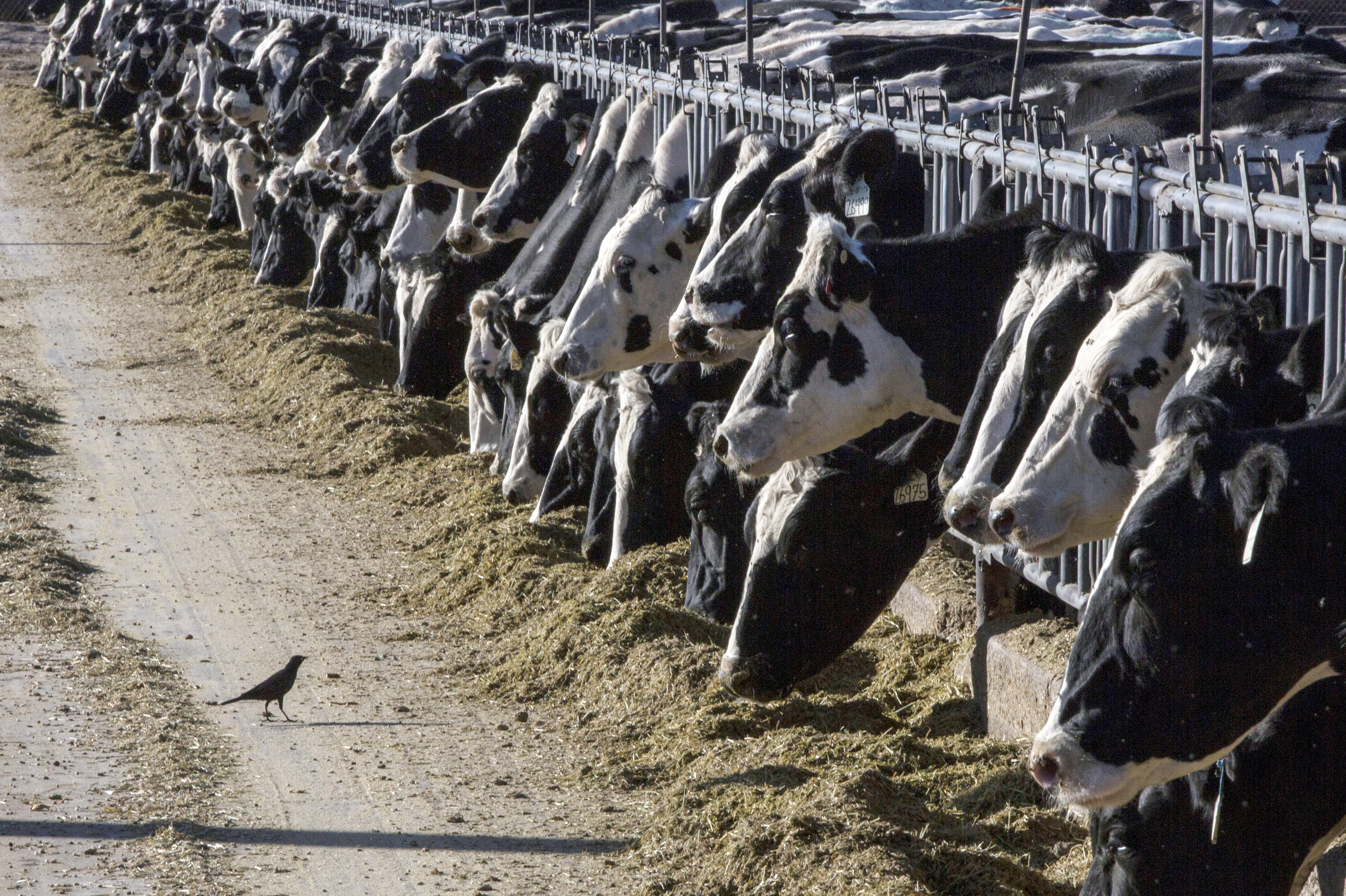
Dairy cattle feed at a farm on March 31, 2017, near Vado, N.M. The U.S. Department of Agriculture says cows in multiple states have tested positive for bird flu.
Rodrigo Abd / AP
Livestock at multiple dairy farms across the U.S. have tested positive for bird flu — also known as highly pathogenic avian influenza, or HPAI — in an outbreak that's likely spread to at least five states.
The U.S. Department of Agriculture's Animal and Plant Health Inspection Service confirmed Friday that cows in Texas, Kansas and Michigan had been sickened by the virus, and there were presumptive positive test results for additional herds in New Mexico and Idaho.
It's the first time the disease has been found in dairy cattle, according to the American Veterinary Medical Association.
The cases come just days after a group of young goats contracted bird flu on a Minnesota farm.
Related: Oregon on alert as bird flu cases continue to rise on the East Coast
Bird flu infects the respiratory and gastrointestinal tracts of birds and is often fatal to avian populations. It can spread from wild birds to commercial poultry and backyard flocks as well as terrestrial and marine mammals and humans.
Government officials say the risk to the public amid the current outbreak remains low. Most past human infections have occurred after people had "unprotected exposures to sick or dead infected poultry," according to the Centers for Disease Control and Prevention. And officials say the strain of the virus detected in Michigan is similar to the one found in Texas and Kansas, which was shown through initial testing not to include any changes that would make it more transmissible to humans.
The rash of bird flu infections should also not dramatically impact consumers of dairy products, federal and state officials say.
"Understanding the details surrounding the transfer of avian virus to livestock is the top priority of animal health professionals and agriculture agencies," Texas Agriculture Commissioner Sid Miller said in a statement. "While troubling, this outbreak is not currently expected to threaten our nation's commercial dairy supply."
There is virtually no impact on consumers so far
The country's commercial dairy supply is safe and a milk recall is unnecessary, the USDA says.
That's because dairies are required to divert or destroy any milk from impacted livestock, and only milk from healthy cows can be processed for human consumption.
Additionally, pasteurization — which is required for milk entering interstate commerce — kills bacteria and viruses, including influenza.
Related: Bird flu means higher egg prices, now there’s a chick boom hatching across US
The Food and Drug Administration says there is limited information available about the transmission of bird flu in raw, unpasteurized milk. The agency has long warned people to avoid raw milk, which it says can harbor dangerous bacteria and sicken consumers.
Federal officials say the loss of milk from ill dairy cows is too limited to significantly impact the commercial supply, which is typically higher in the spring due to increased seasonal production. Dairy prices are not expected to rise due to the outbreak, they added.
How regulators and farmers are working to contain the spread
The USDA believes the dairy cows have been sickened by a strain called H5N1, Eurasian lineage goose/Guangdong clade 2.3.4.4b, which was likely introduced by wild birds. Pigeons, blackbirds and grackles were identified at the affected Texas farms.
But federal officials are also not ruling out the possibility of cow-to-cow transmission. That's after a Michigan farm recently received a shipment of cattle from an affected Texas farm before any of the cows show signs of disease, the Michigan Department of Agriculture and Rural Development said Friday.
Related: Bird flu outbreak, first of its kind in 7 years, creates challenges for Central Oregon farmer
Cows sickened by bird flu at affected dairy farms have recovered "after isolation with little to no associated mortality reported," according to the USDA.
Federal and state agencies are continuing to test sick livestock and unpasteurized milk samples.
The USDA also recommends that farmers and their veterinarians practice "good biosecurity," which includes limiting animal movements, testing livestock before they're moved and isolating sick cows.
Copyright 2024 NPR. To see more, visit https://www.npr.org.


